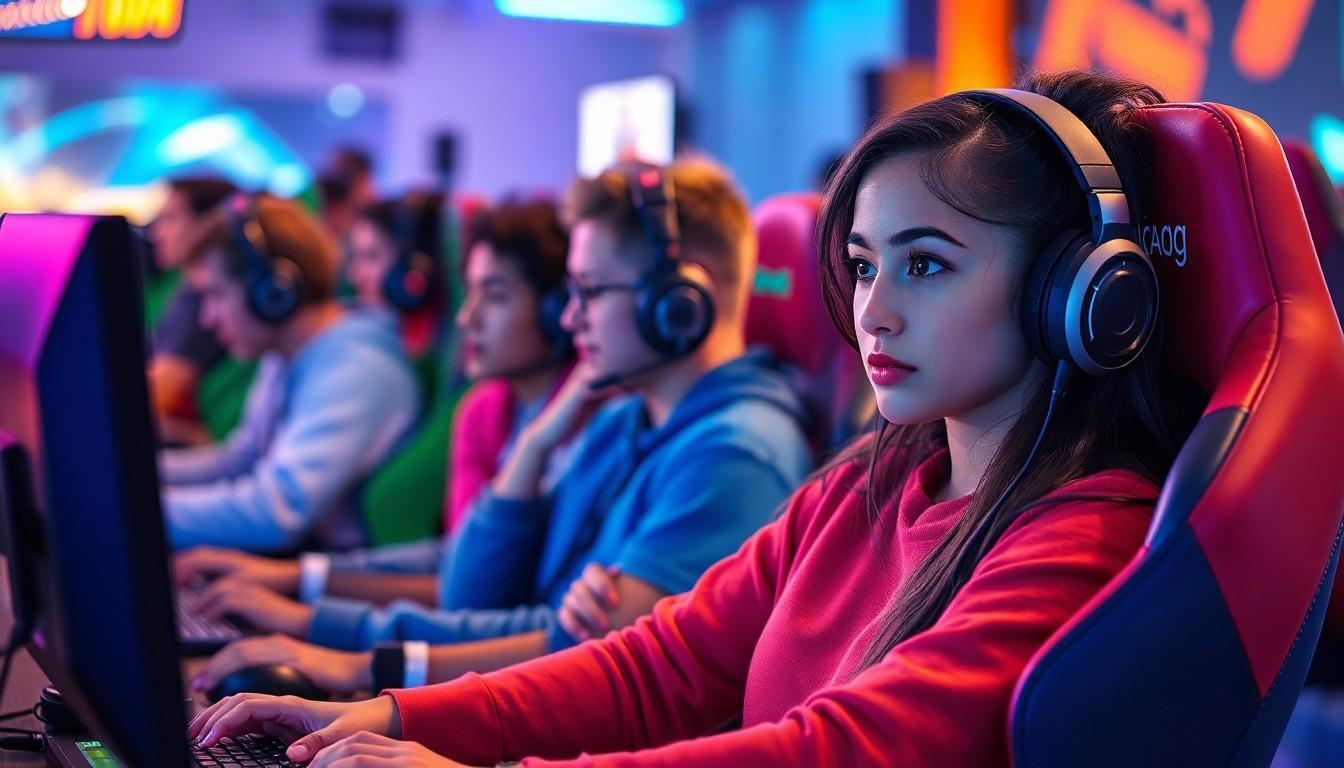In a world where gaming has evolved from basement dwellers to global phenomena, virtual game tournaments are the ultimate playground for the competitive spirit. Picture this: players from every corner of the globe, battling it out in epic showdowns, all from the comfort of their couches. It’s like the Olympics, but with fewer track suits and more snacks!
Virtual Game Tournaments
Virtual game tournaments represent a competitive landscape where players engage from their homes. These online events attract global participation, showcasing talent and fostering community.
Definition And Significance
Virtual game tournaments involve structured competitions conducted online, where players compete in various video games. These tournaments serve as platforms for professional gamers to showcase skills, gain recognition, and earn prize money. Significant growth in esports has led to increased viewership and sponsorship opportunities, mirroring traditional sports events in many ways. Such competitions also promote inclusivity, as players from diverse backgrounds participate regardless of physical location.
Popular Genres And Formats
Competitors often engage in a range of popular genres during virtual game tournaments. First-person shooters, multiplayer online battle arenas, and real-time strategy games dominate the scene. Formats vary widely, including single-elimination, double-elimination, and round-robin structures. Battle Royale games, like Fortnite and Apex Legends, draw vast audiences with their dynamic gameplay. Team-based shooters, such as Counter-Strike and Overwatch, invite cooperation and strategic play among participants. Each genre and format contributes to the vibrant landscape of esports, captivating gamers and viewers alike.
Key Features Of Virtual Game Tournaments

Virtual game tournaments showcase various features that enhance the competitive experience, making them a pivotal aspect of esports.
Online Platforms And Accessibility
Many online platforms host virtual game tournaments, offering easy access to gamers globally. Services like Twitch, Discord, and Steam facilitate streaming and community interaction. Players can conveniently register for tournaments, irrespective of their location. Various devices, including PCs, consoles, and mobile devices support participation, allowing diverse player demographics to join. Gamers benefit from the flexibility offered, engaging in tournaments from the comfort of their homes.
Tournament Structure And Rules
Specific tournament structures define competition formats, ensuring organized play. Single-elimination and round-robin arrangements dominate the landscape, affecting strategy and player performance. Each format presents unique opportunities, catering to different skill levels and game types. Clearly outlined rules govern gameplay and ensure fair competition. Participants receive guidelines detailing match protocols, scoring systems, and any penalties for violations, enhancing overall integrity. Formats accommodate numerous players, fostering community while maintaining a highly competitive environment.
Benefits Of Participating In Virtual Game Tournaments
Participating in virtual game tournaments provides numerous advantages, enhancing both gaming skills and social connections.
Skill Development And Team Building
Competitors refine their gaming abilities through strategic play and real-time decision-making. Engagement in these tournaments fosters teamwork, allowing players to learn communication and collaboration skills. Gamers practice under pressure, which translates into improved performance in other competitive arenas. Observing experienced players also provides insights into advanced tactics and gameplay strategies, further boosting skill levels. Players aiming for higher rankings develop resilience and adaptability, crucial traits for success in esports and beyond.
Community Engagement And Networking Opportunities
Joining virtual game tournaments connects players with a global gaming community. Gamers meet individuals with similar interests, fostering friendships and professional relationships. Interaction on platforms like Discord and Twitch creates online networks that extend beyond the game. Attendance at events and tournaments provides opportunities for collaboration, mentorship, and recruitment for esports teams. Players gaining recognition can attract sponsors, enhancing their gaming journey and creating paths for future opportunities in the industry.
Challenges In Virtual Game Tournaments
Virtual game tournaments face several challenges that can impact the player experience and competition integrity.
Technical Issues And Connectivity Problems
Technical issues often arise during tournaments, affecting gameplay. Lag and connectivity problems can disrupt matches, frustrating players and viewers. A stable internet connection is crucial for seamless performance. Players frequently encounter server crashes, which can lead to match cancellations or rescheduling. Additionally, varying hardware compatibility might create disparities in performance among competitors. Organizers must prioritize robust infrastructure to minimize these challenges. Event planning teams regularly test systems ahead of time to avoid disruptions during live matches.
Fair Play And Cheating Concerns
Ensuring fair play remains a top concern within virtual game tournaments. Cheating through hacks or exploits threatens the integrity of competition. Many players depend on a level playing field to showcase their skills. Organizers implement strict rules and utilize anti-cheat software to deter dishonest practices. Monitoring tools, alongside moderator oversight, help maintain compliance. Players found violating rules face penalties like temporary bans or disqualification. Establishing a culture of honesty is essential for fostering trust within the gaming community.
A Vibrant Competitive Arena
Virtual game tournaments have transformed the gaming landscape into a vibrant competitive arena. They not only showcase the skills of players around the globe but also create a sense of community among gamers. The accessibility of these tournaments through online platforms enhances participation and engagement, connecting individuals with shared passions.
While challenges like technical issues and cheating persist, the commitment to fair play and structured competition helps maintain the integrity of these events. As esports continues to grow, the future of virtual game tournaments promises even more excitement and opportunities for players and fans alike. Embracing this evolution can lead to new friendships, skill development, and a deeper connection to the ever-expanding world of gaming.

